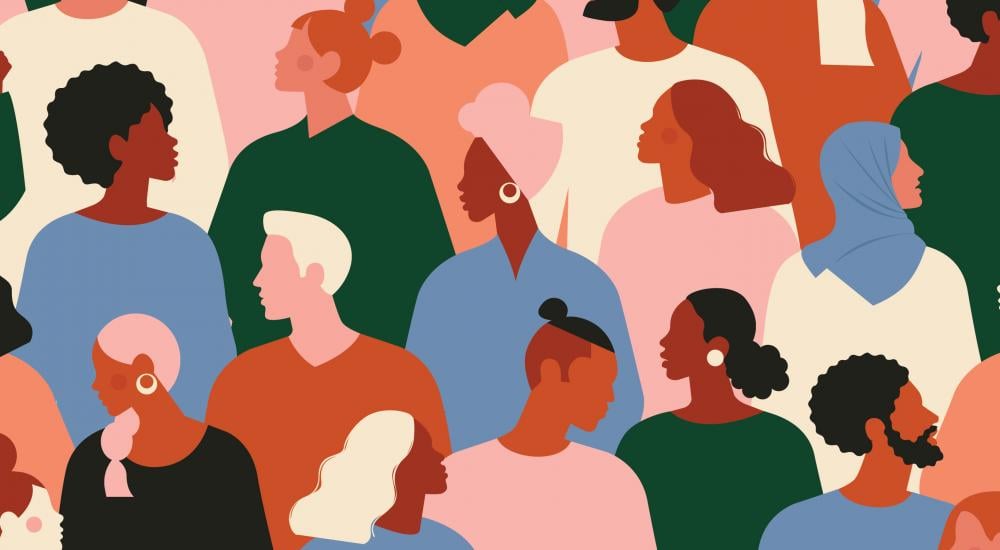From Boomers to Gen Z: Intercultural Approaches to Navigating Multigenerational Offices

As director of undergraduate recruitment at the University of Pittsburgh, Lauren Wright, EdD, oversees a generationally diverse team, ranging from Baby Boomers to Gen Z. Several years ago, she noticed tensions among employees from different age groups stemming from conflicting perspectives. Determined to bridge the differences, she began conducting research on generations in the workplace and exploring ways to boost teamwork as part of her doctoral program.
Wright, whose research resulted in her dissertation, “The Efficacy of Training as a Tool for Helping Managers Successfully Supervise a Multigenerational Workforce in College Admissions and Financial Aid,” says that there “seemed to be a communication divide between the older and younger generations, and it affected overall satisfaction.”
For example, senior leadership in Wright’s office preferred to hold staff meetings as a means of making decisions, disseminating information, and discussing day-to-day operations. On the other hand, the Millennials—comprising about 60 percent of the staff—felt like frequent meetings were taking away too much time from other tasks and that critical information could be shared through instant messages (IMs) or texts.
“Senior leaders were frustrated that younger team members were complaining about meetings, but they took time to listen,” says Wright. “Ultimately we came to a happy medium where we cut down on the full staff meetings and try to hold fewer, smaller meetings targeted at specific issues.”
Cross-Generational Communication
Wright’s team reflects the twenty-first century workforce at large, which for the first time in history includes members from five generations: Traditionalists, Baby Boomers, Generation (Gen) X, Millennials, and Gen Z—with Millennials making up more than a third of the nation’s workers. Each group has distinct characteristics and perspectives, shaped by the cultural and world events that occurred during their formative years. They bring a variety of strengths and weaknesses to the table, and sometimes they struggle to see eye-to-eye.
Many international educators are familiar with and skilled at intercultural communication within the context of their work with students. How can these same principles apply to their own workplaces to bridge the cultural divides between generations? And how can leaders help staff use these approaches to achieve better teamwork?
How can these same principles apply to their own workplaces to bridge the cultural divides between generations? And how can leaders help staff use these approaches to achieve better teamwork?
In Manual for Developing Intercultural Competencies: Story Circles, (published by UNESCO in 2020) author Darla K. Deardorff, EdD, wrote, “Intercultural competence refers to the skills, attitudes, and behaviors needed to improve interactions across difference, whether within a society (differences due to age, gender, religion, socio-economic status, political affiliation, ethnicity, and so on) or across borders.” By defining differences to include a wide range of characteristics, including age, Deardorff asserts that intercultural approaches can be used to build stronger relationships—including those that span generations.
“Intercultural dialogue has respect at the heart of open and inclusive interaction,” says Deardorff, executive director of the Association of International Education Administrators (AIEA). “Exploring perspectives, values and assumptions across any kind of difference, including generational differences, can help in building positive teamwork as we take time to truly listen for understanding.”
The Multigenerational Workplace
As Deardorff suggests, bridging generational gaps starts with acknowledging and understanding differences between those age groups. Each generation has its own communication style, expectations, and viewpoints. Here are some of general characteristics by generation:
- Traditionalists (born 1925–1945) tend to be dependable, straightforward, tactful, and loyal. They prefer more personal styles of communication, including handwritten notes or phone calls, as opposed to email. They are loyal to employers and in return expect recognition and respect.
- Baby Boomers (born 1946–1964) are optimistic, hardworking, competitive, and team oriented. They like to communicate in whatever way is most efficient, including face-to-face or phone calls. Much like traditionalists, they feel loyalty toward their employers.
- Generation X (born 1965–1980) is known for independence, skepticism, flexibility, and informality. They look for personal development opportunities and are interested in maintaining a healthy work-life balance. Their preferred communication style resembles that of Baby Boomers.
- Millennials (born 1981–2000) are competitive, civic-minded, open-minded and achievement-oriented. This generation prefers communicating through IMs, texts, and email.
- Generation Z (born 2001–2020) represents digital natives who are global-minded, entrepreneurial, progressive, and less focused. They like to communicate through IMs, text, and social media.
Source: Purdue University Global
These descriptions of generational characteristics are not meant to stereotype people according to their age group. Instead, they provide a starting point for appreciating differences. Intercultural approaches can then be used to foster appreciation, understanding, and respect.
“These guidelines [may give insight] to how someone from a certain generation might behave, what they might prefer, what their characteristics are, but nothing beats getting to know your team one-on-one and getting to know people individually,” Wright says.
Intercultural Approaches Can Bridge Generational Divides
Intercultural skills—including respect, openness, curiosity, empathy, and cultural humility—are often championed as one of the top outcomes for students participating in international experiences. These skills help students understand other cultures, and those who work in international education can put the same approaches to use in their own workplaces.
Respect
Respect means valuing each individual, regardless of the generation they were born into, and appreciating the strengths and perspectives they bring to the table. Younger workers, for example, may prefer communicating through technology while older team members may prefer high-touch approaches. Acknowledge differences, but find ways colleagues can work together to enhance institutional outcomes.
Openness
Openness refers to a willingness to learn from other cultures. When applied in the context of different generations, what can people, no matter their age, learn from each other? While young workers can benefit from the wisdom of older generations, those with more experience should be open to the fresh perspectives of their younger coworkers.
Curiosity and Empathy
Instead of passing judgment on the ways of other generations, show curiosity and empathy toward the core values and experiences that drive a person’s thoughts and behaviors. Doing so requires require self-awareness of staff members’ own strengths, biases, and expectations.
“Assessing your own values and understanding where the other person is coming from may help drive your conversations with them and build those personal relationships,” says Rodolfo Altamirano, PhD, executive director of international student and scholar services as well as immigration and integration services for Penn Global at the University of Pennsylvania. “We have our own biases and prejudices, but we put them aside because we have a common goal of making sure that we work well together.”
Cultural Humility
Cultural humility is the idea that no one will ever be completely culturally competent. There’s always room to grow. “It's that lifelong learner mindset,” says Thomas Sirinides, MA, director of international student services in New York University’s Office of Global Services. “It’s [acknowledging that] I will never be done understanding differences, but I can always learn more.”
Cultivating Generational Inclusiveness in the Workplace
There are number of strategies that could bridge the divides between employees of different generations. Here are a few:
Training Sessions
At the University of Kentucky, the human resources team offers a half-day workshop, “Generations in the Workplace” introducing participants to generational core values and how they impact motivation and behavior at work. That can help resolve conflicts and foster positive interactions. Suzanne McGinnis, MA, assistant director of admissions and recruitment, has her new team members participate in the workshop.
“After they participate, you see a difference in how they approach the other members of the team, and how they’re able to take what they have learned and make their relationships more productive,” says McGinnis, whose team members range in age from 22 to over 80. “It really develops a culture of understanding.”
Teambuilding Activities
Deardorff has used teambuilding activities with her small but diverse AIEA team to cultivate positive relationships. For example, her team takes monthly lunch outings to try restaurants none of them have experienced. “Food is something that everyone can share, even across generations,” Deardorff says. “Being intentional about teambuilding around something everyone has in common everyone can build those professional relationships. That, in turn, deepens the trust your team members have among each other.” Other potential teambuilding activities include staff excursions (such as to a park or a museum), online games, or volunteer service projects.
Story Circles
Deardorff recommends a story circle methodology, developed by UNESCO, to practice key intercultural competencies. This technique brings small groups of people together to share their personal stories, promoting understanding and listening skills and drawing out people’s commonalities.
In the spirit of story circles, which Deardorff facilitated for the World View public service program at the University of North Carolina-Chapel Hill in 2019, director Charlé LaMonica, MA, has dedicated time at the beginning of weekly staff meetings to helping team members get to know each other. Several days before the meetings, she sends out a question—for example, “What historical figure has inspired you?”—and gives each person a chance to respond during the meeting.
“Every person shares as little or as much as they want, and we come away from that knowing a little bit more about our colleagues—even those we’ve been working with for a number of years,” LaMonica says. “We don’t comment on anyone else’s experience. We just focus on listening to each other. It helps develop a better team spirit before you do the deep dive into work.”
Opportunities Through Difference
Though workers in today’s job market may span a wide range of ages, the diversity of life experiences and perspectives they bring to their jobs offers a wellspring of opportunity. LaMonica tries to find the strengths that each of her team members brings to their work. The digital natives, for example, might be able to shed light on better ways of communicating. Workers with more experience in international education can shed light on how developments and trends have shaped the field. Providing opportunities to bring these groups together builds relationships and enhances collaboration.
“Putting their strengths together is really exciting,” says LaMonica. “If you can help people communicate better, you will have a more successful workplace.” •
About International Educator
International Educator is NAFSA’s flagship publication and has been published continually since 1990. As a record of the association and the field of international education, IE includes articles on a variety of topics, trends, and issues facing NAFSA members and their work.
From in-depth features to interviews with thought leaders and columns tailored to NAFSA’s knowledge communities, IE provides must-read context and analysis to those working around the globe to advance international education and exchange.
About NAFSA
NAFSA: Association of International Educators is the world's largest nonprofit association dedicated to international education and exchange. NAFSA serves the needs of more than 10,000 members and international educators worldwide at more than 3,500 institutions, in over 150 countries.
NAFSA membership provides you with unmatched access to best-in-class programs, critical updates, and resources to professionalize your practice. Members gain unrivaled opportunities to partner with experienced international education leaders.














